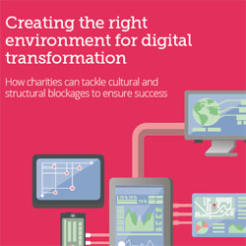Digital teams need to develop better relationships with colleagues in IT and elsewhere in the organisation for the full potential of digital to come about, according to a report from Eduserv.
Eduserv, a charity which provides IT services to the sector, carried out a survey of 107 delegates at last year’s Charity Technology conference, and then followed this up with a roundtable event and produced the report Creating the right environment for digital transformation: How charities can tackle cultural and structural blockages to ensure success.
Civil Society News reported the results of the survey in January, which found that most charities planned to focus on using digital for service delivery in the coming year.
“Charities now need a complete culture change that goes beyond the need for digital competence, digital literacy or new technology,” the report concludes. “This can only start by creating a consistent vision of what digital transformation means for the organisation and explaining to all parties how digital can solve the biggest organisational challenges.”
Tim Cockle, head of digital services at Eduserv, said: “Digital service delivery is the top priority for charities in 2015, yet many organisations do not have the knowledge, skills or IT infrastructure to achieve their ambitions.
“While it is clear charities need to invest in these areas to build the foundations for their digital future, our research also shows there is also a wider need for charities to build a digital-first culture beyond their core IT and digital teams so they can increase the pace of change.
“This needs to start with the trustees and leaders at the top so that they are structured, managed and organised in a way which effectively supports digital transformation.”
Solutions
The report describes the support of the IT team as “critical to digital transformation” and says that: “It’s also important for digital teams to remember how much they can still learn from IT and keep communication flowing two ways.”
It suggests this could be done by regular meetings, sitting in the same area of the office, secondments between the two teams or even a complete merger of the two departments.
According to the report a lot of decision-makers still include ‘digital’ within ‘technology’. “This, in a lot of cases, fosters apathy or, at worst, mistrust,” it says, as previous technology projects may have failed to produce results.
Coral Stanion-Nazeri, digital communications manager at Action for Children, who took part in the roundtable, said: “What you have to remember is that our staff joined up to help people and have been frustrated by failed technology projects in the past. So you need to give them the full context and explain how digital is a rounded approach that will help them and our whole organisation to do that better.”
The report suggests that charities should create a role for a ‘digital transformation manager’ to lead on projects.
To address the problem of “structural divisions that hamper innovation and co-operation” Eduserv suggests adopting agile methodologies, focusing on smaller ‘products’ over a short timescale, rather than long-term projects and engage regularly with all stakeholders.
- Civil Society Media's Charity Technology Conference will take place on 19 November. Book your place online here.








